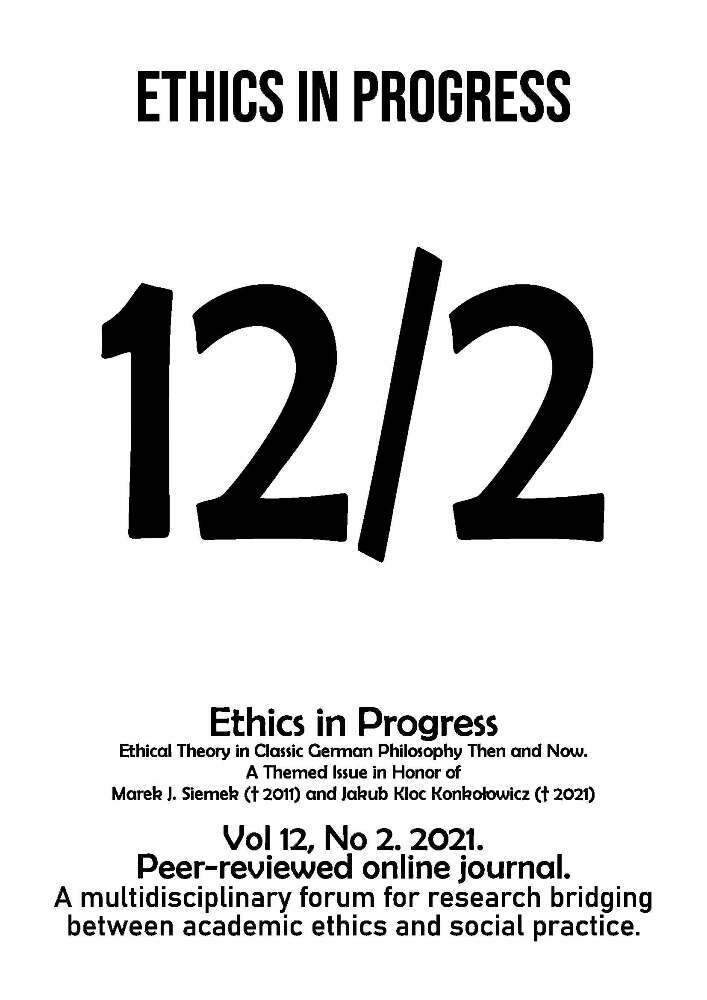Abstract
Moving from Fichte’s assumption that “the essence of the I is its activity”, this paper tries to analyze the meaning and implications of the idea of “activity” [Tathandlung] in order to explicate the peculiarities of Fichte’s critical, transcendental, and moral idealism. Fichte’s idea of activity will be examined with reference to such basic concepts as collision [Anstoss], interaction [Wechselwirkung], inter-determination [Wechselbestimmung], and striving [Streben]. However, it is freedom which frames and connects the core components of Fichte’s thinking and sets up the goal of his philosophy of action. What freedom accounts for, can be identified both at the transcendental level, in the internal dynamic of infinity and finitude constituting the subjectivity of the I, and at the moral and social levels of Fichte’s thought, as the goal of the human action in history and in the society. In assuming the unitary character of Fichte’s philosophical system, concluding remarks are developed concerning the moral meaning of the act of striving for freedom and, conversely, the immorality of attitudes and feelings such as fear, resignation, and fatigue.
References
Alessiato E. 2020. “Lessico, funizoni e storicizzazione. Un esercizio per rispondere alla domanda: Che cos’è che fa il dotto di Fichte?,” Introduction to J. G. Fichte, La missione del dotto, ed. by E. Alessiato (pp. 9–74 and pp. 45–52). Napoli – Salerno: Orthotes.
Bertinetto A. 2016. “Freude am Tun: Il sentimento dell’agire nella filosofia di Fichte,” Spazio filosofico 16:95–109.
Breazeale D. 1995. “De la ‘Tathandlung’ à l’ ‘Anstoss’ et retour: liberté et facticité dans le Principes de la Doctrine de la Science,” in J.-L. Vieillard-Baron (Ed.), Le bicentenaire de la Doctrine de la science de Fichte, 1794-1994. Actes du Colloque de Poitiers (4-6 octobre 1994), organisé par le Centre de recherche et de documentation sur Hegel et Marx (pp. 69–87). Lille: Les Cahiers de Philosophie.
Cesa C. 1992, “Sul concetto di ‘pratico’ in Fichte,” in idem, Fichte e l’idealismo trascendentale (pp. 101–119). Bologna: Il Mulino.
De Pascale C. 1995. Etica e diritto. La filosofia pratica di Fichte e le sue ascendenze kantiane. Bologna: Il Mulino.
De Pascale C. 2001. Vivere in società, agire nella storia. Libertà, diritto, storia in Fichte. Milano: Guerini & Associati.
Druet P.-P. 1972. “L’‘Anstoss’ fichtéen: essai d’elucidation d’une métaphore,” Revue philosophique de Louvain 70:384–392.
Eidam H. 1997. “Fichtes Anstoß. Anmerkungen zu einem Begriff der Wissenschaftslehre von 1794”, Fichte Studien 10:191–208.
Fichte J. G. 1962-2012. Gesamtausgabe der Bayerischen Akademie der Wissenschaften (GA), vols. 1–42, ed. by R. Lauth et al. Stuttgart – Bad Cannstatt: Frommann-Holzboog.
Janke W. 1970. Fichte. Sein und Reflexion. Grundlagen der kritischen Vernunft. Berlin: Walter de Gruyter.
Pareyson L. 11976/2011. Fichte. Il sistema della libertà. Milano: Mursia.
Rivera de Rosales J. 1999. “Die Begrenzung. Vom Anstoss zur Aufforderung”, Fichte-Studien 16:167–190.
Schurr A. 1974. Philosophie als System bei Fichte, Schelling und Hegel. Stuttgart-Bad Cannstatt: Frommann-Holzboog.
Soller A. K. 1997. “Fichtes Lehre vom Anstoß, Nicht-Ich und Ding an sich in der Grundlage der gesamten Wissenschaftslehre: Eine kritische Erörterung”, Fichte-Studien 10:175–189.
Vieillard-Baron J.-L. 2016 (2nd Ed.). La destination du savant. Introduction historique, traduction et commentaire par J.-L. Vieillard-Baron (pp. 9–39 and 107–211). Paris: Vrin.
Wood D. W. 2017. “The ‘Double Sense’ of Fichte’s Philosophical Language. Some Critical Reflections on the Cambridge Companion to Fichte,” Revista de Estud(i)os sobre Fichte 15:3–6.





